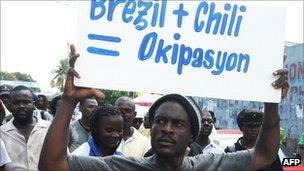Haiti police battle anti-UN protesters
- Published

Some Haitians regard the UN peacekeepers as an occupying force
Police in Haiti have used tear gas to disperse hundreds of protesters demanding the withdrawal of UN peace-keeping troops from the country.
The clashes happened outside the presidential palace in the capital, Port-au-Prince.
The protests were triggered by allegations that UN troops from Uruguay raped a Haitian man.
UN peacekeepers from Nepal have also been blamed for starting a deadly cholera epidemic last year.
Chanting "rapists" and "Minustah (the UN force) must go," about 300 protesters marched on the presidential palace.
Some threw rocks at riot police who responded with tear gas.
Fleeing protesters disrupted a nearby camp for people made homeless by last year's huge earthquake.
Controversy
The UN peacekeeping force was first deployed in Haiti in 2004 to restore order following the overthrow of President Jean-Bertrand Aristide.
Its mandate was extended after the devastating earthquake in January 2010, and its strength was increased to around 12,000.
Minustah has helped post-earthquake recovery efforts and supervised this year's presidential election.
But it has also drawn controversy, including allegations of excessive use of force.
Some Haitians regard it as an occupying force.
Its reputation was particularly damaged by last year's cholera epidemic, which is thought to have been caused by sewage from a camp housing peacekeepers from Nepal.
Earlier this month the emergence of a video showing Uruguayan marines apparently abusing an 18-year-old Haitian man provoked widespread anger.
Uruguay has apologised for the alleged rape, and a full investigation is under way.
Haitian President Michel Martelly is expected to ask for a renewal of the UN mission's mandate, which expires next month.
But he has said he wants the Minustah's security role reduced and eventually replaced by a Haitian force.
South American nations - which contribute about half the peacekeeping force - have also said they want to reduce its size to pre-earthquake levels.